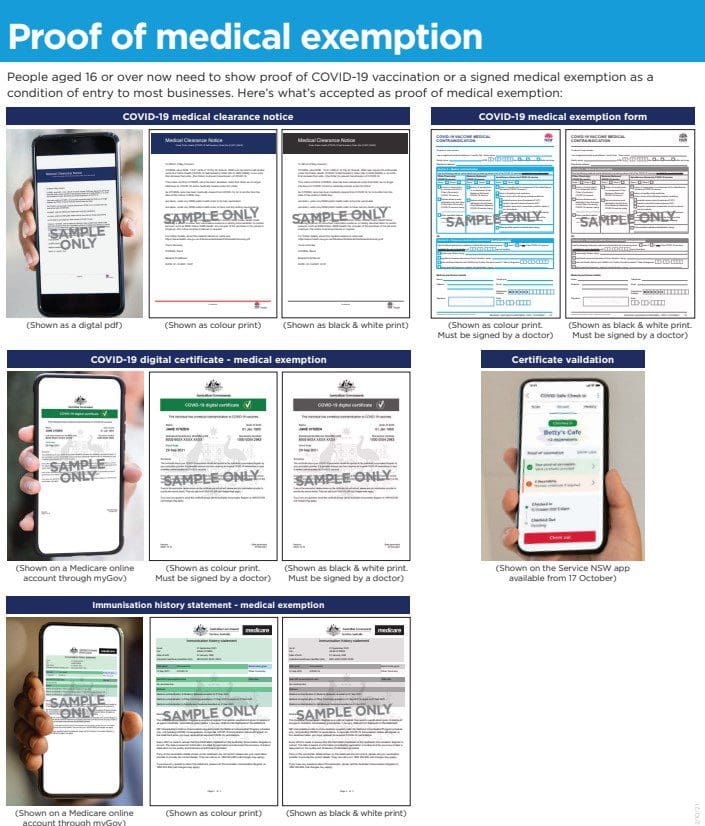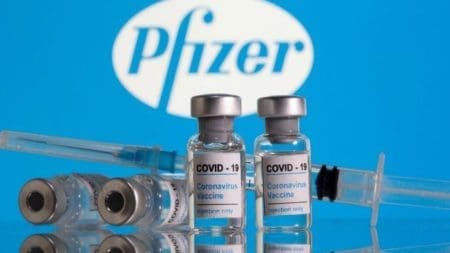Updated: The time frame for temporary deferral of vaccination following SARS-CoV-2 infection has been updated from
6 months to 4 months. The below guidance is prepared to support completion of the Australian Immunisation Register immunization medical exemption (IM011) form, Guidelines for immunization medical exemption. This advice covers those for whom an exemption can be provided and does not cover clinical management of adverse events. For the management of adverse events refer to your local Specialist Immunisation Service.
Background
COVID-19 vaccines have been demonstrated to be safe and effective and as such are recommended for all
Australians from 5 years of age. There are very few situations where a vaccine is contraindicated and as
such, medical exemption is expected to be rarely required.
Temporary exemptions
An exemption should not be given when an alternative COVID-19 vaccine is available and when completing the medical exemption (IM011) FORM all COVID-19 brands must be selected.
Valid reasons for a temporary exemption include:
- For an mRNA COVID-19 vaccine, inflammatory cardiac illness within the past 3 months, e.g., myocarditis or pericarditis; acute rheumatic fever or acute rheumatic heart disease (i.e., with active myocardial inflammation); or acute decompensated heart failure
- For all COVID-19 vaccines:
- Acute major medical condition (e.g. undergoing major surgery or hospital admission for a serious illness). Typically, these are time-limited conditions (or the medical treatment for they are time-limited).
- PCR-confirmed SARS-CoV-2 infection, where vaccination can be temporarily deferred up until 4 months after the infection. Ensure when reporting this temporary medical deferral to the AIR it is not for a duration longer than 4 months. (Vaccination should be deferred for 90 days in people who have received antiSARS-CoV-2 monoclonal antibody or convalescent plasma therapy).
- Any serious adverse event attributed to a previous dose of a COVID-19 vaccine, without another cause identified, and with no acceptable alternative vaccine available. For example, a person <60 years of age, contraindicated to receive Pfizer vaccine and in whom the risks do not outweigh the benefits for receipt of AstraZeneca vaccine, is eligible for a temporary exemption.
- If the vaccinee is a risk to themselves or others during the vaccination process they may warrant a temporary vaccine exemption. This may include a range of individuals with underlying developmental or mental health disorders, but noting that non-pharmacological interventions can safely facilitate vaccination in many individuals with behavioral disturbances and that specialist services may be available to facilitate the safe administration of vaccines in this population.
**Chronic symptoms following COVID-19 (“Long COVID”) are not a contraindication to COVID-19 vaccines but do warrant a clinical discussion with the patient. Pregnancy is not a valid reason for the exemption in the absence of any of the criteria listed above.
Assessment of serious adverse events following immunization (AEFI)
An adverse event is considered serious if it:
• requires in-patient hospitalization or prolongation of existing hospitalization OR results in persistent or significant disability/ incapacity OR is potentially life-threatening.
AND
• has been reported to a state/territory adverse event surveillance system and/or the TGA.
AND
• has been determined following review by, and/or on the opinion of, an experienced immunization provider/medical specialist to be associated with a risk of recurrence of the serious adverse event if another dose is given.
Assessment of an adverse event following immunization (AEFI) requires detailed information on the event, a determination of the likelihood of a causal link with vaccination, as well as the severity of the condition.
Examples of serious AEFI include thrombosis with thrombocytopenia (TTS) following Vaxzevria [COVID-19 Vaccine AstraZeneca]); medically significant illness (e.g., immune thrombocytopenic purpura (ITP), myocarditis), potentially life-threatening events (e.g., anaphylaxis); and/or persistent or significant disability (e.g., Guillain-Barré Syndrome). These reactions do not include commonly expected local or systemic reactions known to occur within the first few days after vaccination.
Attributing a serious adverse event to a previous dose of a COVID-19 vaccine may require discussion with the individual’s GP, local immunization service, or relevant medical specialist.
NOTE: This publication is provided for general information purposes only and is not intended to cover every aspect of the topics with which it deals. It is not intended to amount to advice on which you should rely. You must obtain professional or specialist advice before taking, or refraining from, any action on the basis of the content in this publication.













